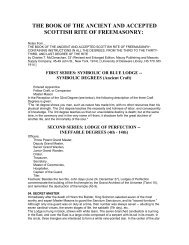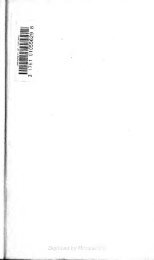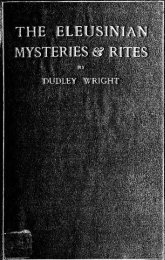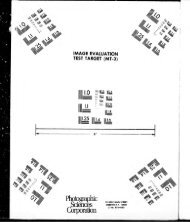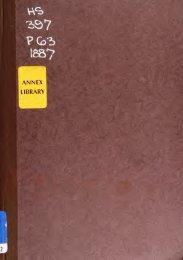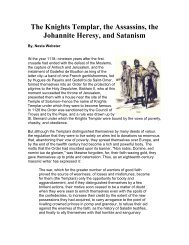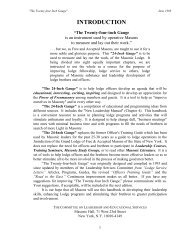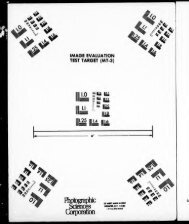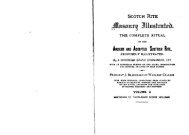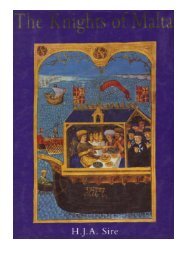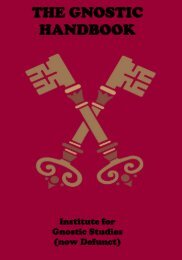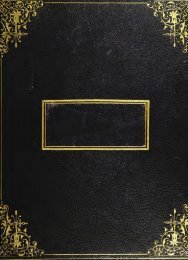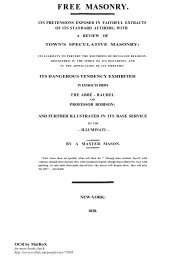The History of Initiation - The Masonic Trowel
The History of Initiation - The Masonic Trowel
The History of Initiation - The Masonic Trowel
Create successful ePaper yourself
Turn your PDF publications into a flip-book with our unique Google optimized e-Paper software.
DOCTRINES OF THE DRUIDS. 151<br />
was celebrated by the bards in all the language <strong>of</strong> grave<br />
and l<strong>of</strong>ty panegyric;, and even the possession <strong>of</strong> an<br />
orchard containing one hundred and forty-seven apple<br />
trees <strong>of</strong> equal size, age, and beauty, with wide spreading<br />
branches, and pure white blossoms, succeeded by<br />
delicious fruit, was a prize more splendid and desirable<br />
than any temporal dignity or spiritual rank. 4<br />
It is to be remarked that one hundred and forty-seven<br />
was a magical number, produced by multiplying the<br />
square <strong>of</strong> seven by the sacred number three; for, like the<br />
rest <strong>of</strong> the world, the Druids paid the most sacred regard<br />
to odd numbers. In them, some unusual charm was supposed<br />
to exist which would propitiate the favour <strong>of</strong> the<br />
deity, and secure to the pious worshipper the blessing<br />
<strong>of</strong> divine protection. <strong>The</strong> number three was held in<br />
and hence the<br />
peculiar veneration by this order <strong>of</strong> men ;<br />
arrangement <strong>of</strong> classes both in civil and religious polity<br />
partook <strong>of</strong> a ternary form.5 Nothing could be transacted<br />
without a reference to this number. On solemn occasions,<br />
the processions were formed three times round the<br />
sacred inclosure <strong>of</strong> Caer Sidi; 6 their invocations were<br />
thrice repeated, and even their poetry was composed in<br />
triads. 7 <strong>The</strong> ternary deiseal, 8 or procession from east to<br />
4<br />
Myrddin's Avallenau. in Dav. Druid., p. 465.<br />
5 Thus Gaul was divided into three provinces, the Belgae, the<br />
Acquitani, and the Celtae ; the inhabitants were <strong>of</strong> three classes, the<br />
Druids, the Equites, and the Plebs ; and the hierarchy consisted <strong>of</strong><br />
three gradations, the Druids, the Bards, and the Eubates. Wales,<br />
England, and Scotland, were denominated Cymru, Lloeger and Alban ;<br />
and Robert <strong>of</strong> Gloucester gives these names to the three sons <strong>of</strong> his<br />
fabulous king Brutus.<br />
But this noble prince sones had thre,<br />
By hys wyf Innogen, noble men and fre,<br />
Locryn and Kamber and Albanak al so, &c.<br />
c Pennant's Tour in Scotl., P. ii., p. 15.<br />
7 <strong>The</strong> triads <strong>of</strong> the bards, like the proverbs <strong>of</strong> every country in the<br />
world, were a series <strong>of</strong> truisms wrapt up in pithy sentences adapted<br />
to oral transmission; and it appears highly probable that many <strong>of</strong><br />
the abstruse secrets <strong>of</strong> religion ; the sacred lore <strong>of</strong> Druidism ; the<br />
institutional maxims <strong>of</strong> the bards, were communicated in this form, as<br />
well calculated for being treasured up in the memory; for we have it<br />
on record that these secrets were contained in 2(XOOO verses, which<br />
required twenty years' study to understand perfectly. (P. Mela,<br />
1. 3,<br />
c. 2. Ces., 1. 6. c. 2.) <strong>The</strong> public triads, however, which were scat-<br />
tered amongst the people, did not exceed three hundred, according to<br />
tradition (W. Arch., vol. 2, p. 75), <strong>of</strong> which little more than a third<br />
part have descended to our times (Dav. Dm., p. 30).<br />
s Toland. Druids, p. 108.



